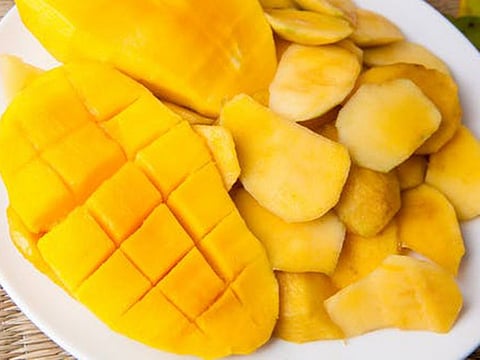Is it healthy to eat mangoes every day?
No doubt, they're the king of fruit, but you need a strategy

My love for mangoes are flavoured by childhood nostalgia, perhaps more than the taste of the fruit itself. As a child, I would always watch in awe while my mother bought mangoes by the dozen, for my father. It didn’t really matter which ones they were: They were mangoes, and they were ripe. My mother would be a little anxious and mutter in concern about eating too many, but for my father, there was never such a thing as too many mangoes.
It’s probably the motto for most of us, who grew up eating mangoes. It’s not just a fruit; it spells the beginning of summer. That bright yellow, the fragrance, and the bowls of bite-sized mangoes, just a way of relaxing and cooling down.
So, it’s no surprise that it irks people when they’re told to 'watch how many mangoes' they eat. Do you really need to? To sort out this seasonal dilemma, we spoke to the experts—and yes, there's a way to enjoy mangoes without guilt.
The nutritional power of mangoes
Mangoes are packed with essential nutrients, especially vitamin C and vitamin A, which according to Lina Doumani, Clinical Dietician, Medcare Camali Clinic says are, two antioxidants known to boost immunity, support vascular health, and collagen production. These antioxidants also help fight free radicals that are carcinogenic (might cause cancer) and give glow to skin, ad she says.
Mangoes also have polyphenols, powerful plant compounds that help reduce inflammation and protect your cells from damage. Plus, they’re a good source of dietary fibre, about 2.6 grams per cup, which supports a healthy gut, helps prevent constipation, and keeps your digestion regular. They even contain vitamin A and lutein, both of which are great for maintaining good eye health.
So how many mangoes are too many?
While they are unbelievably delicious, mangoes are also naturally high in sugar. “Mangoes should be consumed in moderation and part of a balanced diet, since they contain high amounts of natural sugars,” says Doumani. “On average, there are 45 grams of sugar per fruit or 22 grams per cup of diced mangoes. Consequently, this may result in blood sugar spikes in prediabetic and diabetic patients.”
To blunt the sugar spike, Doumani recommends eating mangoes with protein- or fat-containing foods, such as raw nuts. “In general, moderate consumption of mangoes is always recommended since overconsumption can lead to excess caloric and carbohydrate intake, which can result in weight gain for some individuals.”
‘Mangoes aren’t the enemy’
Deepti Palija, Founder of Heart Life Zone, frequently hears concerns from clients trying to lose weight or manage hormones. “The common questions I get about mangoes is: Are they fatty or high in sugar? Will it impact my progress? Is it something I treat as a cheat meal?”
Her answer: “Mango is the most underrated antioxidant fruit.”
Palija breaks it down: one Alphonso mango (about 235g) has approximately 141 calories and is rich in potassium and antioxidants. It can meet 20% of your daily vitamin A requirement and up to 75% of your daily vitamin C requirement.
They should be consumed with protein and fat containing food items such as raw nuts to curb down the sugar spike. In general, moderate consumption of mangoes is always recommended since over consumption can lead to excess caloric and carbohydrate intake, which can result in weight gain for some individuals.

What mangoes actually do for your body
Palija outlines four standout benefits of this tropical fruit:
Boost immunity: “All that vitamin C helps build up your immune system, fight inflammation, and absorb iron,” she says.
Support gut health: “Mangoes have fibre and pectin, which act as a prebiotic—basically food for your good gut bacteria. Great if you're working on bloat, digestion, or gut healing.”
Fight free radicals
She adds: “Think mangiferin, lutein, zeaxanthin—these help with skin clarity, aging, eye health, and even metabolism.”
Nourishment hormones and skin
Owing to the beta-carotene and vitamin E, mangoes nourish your skin and hormonal balance from the inside out.
The key to eating mangoes, Palija says, is strategy. “Mangoes aren’t the enemy. Lack of strategy is. If mango is being had, then I do not recommend any more fruit or sugar for the said day.”
Mangoes aren’t the enemy. Lack of strategy is. If mango is being had then I do not recommend anymore fruit or sugar for the said day....

When mangoes may be problematic
There are, however, a few groups of people who should proceed with caution:
Fructose malabsorption or SIBO
“Mangoes are high in fructose and sorbitol—both fermentable sugars—and can cause gas, bloating, diarrhea, and worsen gut issues if you’re sensitive,” says Palija.
Her advice: “First trial with a small amount (30–50 grams) and monitor symptoms. It can be better tolerated if it is stewed into a chutney and not eaten cold or raw.”
Allergies to cashew, pistachio or latex
As mango peel and sap belong to the same plant family as poison ivy and cashew, ‘it can trigger itching, rashes, or swelling in sensitive individuals,’ she explains.
If that’s you, Palija recommends: “Peel your mango fully, wash your hands, and avoid the skin or sap. If symptoms persist, skip mango entirely.”
Final word, not the enemy
Mangoes are nutrient-rich, flavor-packed, and versatile—but they do require a thoughtful approach. As Palija puts it best: Mangoes aren’t the enemy. Lack of strategy is.”
So go ahead, enjoy the king of fruits—just don’t crown it the ruler of your day’s sugar intake.
Sign up for the Daily Briefing
Get the latest news and updates straight to your inbox


